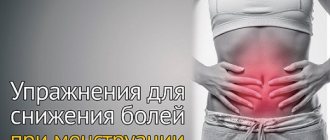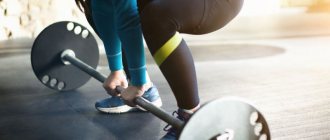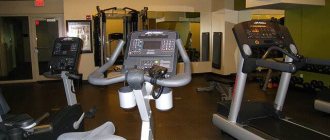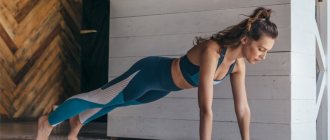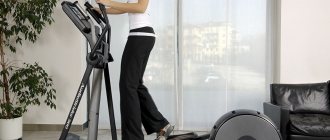For many girls, menstruation is a “legal” way to miss physical education classes at school or college. But if sport is an integral part of life and there is no need to look for a reason to cancel training, a logical question arises: will the stress on your health be negatively affected “these days”? Let's figure it out together with Evgenia Nazimova
, medical trainer of the Basis Genomic Group, gynecologist-endocrinologist of the highest category, chief physician of the Clinic of Doctor Nazimova and expert of the International Festival of Healthy Lifestyle and Sports SN PRO EXPO FORUM.
4 things you shouldn't do after a workout
Phases of the menstrual cycle
A woman’s body is a real work of art created by nature. It is unique and everything in it is thought out to the smallest detail. Its main purpose is to give birth to children. That is why a woman’s body is constantly in a state of readiness for conception, from late puberty (11-16 years) to adulthood (45-60 years).
The menstrual cycle is a periodic change in a woman’s body, the purpose of which is to prepare the body for a possible pregnancy.
It consists of several phases:
- Follicular – at this stage, a follicle is formed from which an egg will emerge. The beginning of this period coincides with the first day of menstrual bleeding and ends at the moment of ovulation;
- Ovulation – that is, the release of an egg ready for fertilization from the follicle into the abdominal cavity. It is noteworthy that the female body contains more than three hundred thousand eggs! And all of them are formed in the womb, and begin to mature during puberty. Ovulation temporarily stops during pregnancy, and with the onset of menopause it disappears completely;
- Luteal - this period is also called the corpus luteum phase: it begins immediately after ovulation and lasts as long as the corpus luteum (follicle) exists - about 10-14 days. The main task of the corpus luteum is the production of hormones - progesterone and estrogen, necessary for normal conception and fetal development until the formation of the placenta. If the egg is not fertilized, the corpus luteum dissolves. Then menstrual bleeding starts again.
The duration of the menstrual cycle in girls ranges from 21 to 36 days. As a rule, this is 28 days.
Important
Still, are training and periods compatible? The answer will be positive, but it is best to refrain from strength training. Moreover, you should not pump up your abs or do certain exercises that involve the abdominal muscles. This can increase menstrual pain.
The most important thing I wanted to say here is that menstruation is not a disease, but a natural state of any healthy woman. Therefore, if a girl feels well, then she can go to the gym and continue training.
How does sport affect your periods?
Every woman's body is individual. For some, periods are almost the same days as usual, while for others it is a very difficult time.
Therefore, girls often wonder: how does sport affect the menstrual cycle?
Professional athletes admit that if “these days” fall during competitions, it becomes a real tragedy.
Studies have shown that during menstrual bleeding, strength and speed indicators, as well as endurance, are significantly reduced. This is due to high levels of estrogen, which causes fluid to accumulate in the body, causing muscles to relax.
Therefore, it is better to cancel intensive training - not only will it not bring the desired effect, but it can also be dangerous. It is better to replace them with other, more gentle types of activity - light jogging, gymnastics, yoga.
Missing periods due to exercise
Some women complain that after they started exercising, their periods disappeared. Of course, their absence, not caused by pregnancy, is a rather alarming sign for a healthy girl. But why does this happen and is it normal?
First of all, remember - if you have never been interested in sports before, and then suddenly decide to take on yourself, your body will perceive the first weeks of training as serious stress. And this, in turn, affects hormonal levels, so a delay in menstruation in the first months of training is quite normal.
Regular exhausting workouts combined with strict diets and lack of sleep are a completely different matter. Such experiments on one’s own body lead to chronic fatigue syndrome, which can also cause menstruation to disappear. In this case, you should give yourself more rest. If the cycle does not resume, visit a gynecologist.
Girls who strive to bring their body to perfection are also at risk. A healthy, fit, beautiful figure is great. But the fat layer plays an important role in the female body. Normally, a girl's body should contain 15-20% fat. This figure absolutely does not fit with ideas about ideal appearance - in order for muscle relief to be clearly visible, the fat level should not exceed 10-12%. This can also cause problems with a woman's menstrual cycle.
In any case, a delay in the red period of more than 10 days is a reason to visit a gynecologist.
Is it possible to exercise during menstruation?
The answer to this question worries many women, since there is a lot of conflicting information about it - from a complete ban on any activity to recommendations to increase the load on critical days.
In fact, it is possible to exercise, and in some cases it is even necessary. But you should choose the load wisely and follow certain rules. This will be discussed below.
Fitness during menstruation: the opinion of gynecologists
The myth that obstetricians and gynecologists categorically prohibit any physical activity during menstruation is quite common.
According to recognized experts in this field, playing sports is possible and even necessary to improve blood circulation during this period. Only too intense, exhausting and strength training are excluded.
Doctors also admit that blood stagnation and muscle spasms are one of the most common causes of pain in the first days of bleeding. Therefore, the lack of movement during this period is even harmful: among the prescriptions for painful periods in healthy women, gymnastic exercises and stretching are often found.
However, if for some reason your doctor has forbidden you to exercise during your period, you should listen to his advice and wait until the bleeding stops.
Payload
The need for physical activity for women of all ages is beyond doubt, says Anastasia Yakovleva. “Research by American scientists has proven the effectiveness of aerobic physical activity as an antidepressant, increasing self-esteem, improving quality of life, energy, and determination. Physical exercise, even walking, speeds up mental processes, increases the body's adaptation, improves tissue regeneration, reduces stress and anxiety, normalizes sleep, hormonal balance, blood pressure, digestive system function, and helps fight depression and chronic fatigue. When performing exercises, there is an increase in the production of endorphins, growth hormone, oxytocin and melatonin, and most importantly, a decrease in cortisol, the stress hormone,” says Anastasia Yakovleva.
One of the main reasons for the need for physical activity and sports in women’s lives is resistance to stress. Scientists have proven that women react more strongly to stimuli than men. Nervous stress and chronic stress provoke premature aging, which manifests itself especially quickly in women's skin. And with age, the reaction intensifies, because estrogens, the “protectors” of the female body, decrease from the age of 35. Cortisol increases blood sugar, the appearance of insulin resistance and significantly accelerates aging and the development of cardiovascular (arterial hypertension, heart attack, stroke), metabolic (obesity, diabetes, osteoporosis) diseases in women.
Dangerous sport. 5 exercise machines that can harm girls Read more
Sports during menstruation: benefits and harm
In fact, correct physical activity has a positive effect on a woman’s body. This is expressed in:
- Reducing pain during menstrual bleeding
- Improving blood circulation
- Eliminating PMS
- Normalization of an unstable cycle
Harm to the female body can only be caused by incorrect loads during menstruation, as well as neglect of personal hygiene rules during training and continuation of exercises despite poor health.
Contraceptives
Monophasic
If you take monophasic birth control, your hormone levels are the same throughout the month. Therefore, there is no need to change your workouts and nutrition within a month.
Three-phase
With triphasic birth control, you take three different types of pills over the course of a month to adjust to your body's natural hormone levels. It is also best to adjust nutrition and workouts to get the maximum effect from them.
Doing it right: sports and exercises during menstruation
It doesn’t matter whether you work out at home or in the gym, whether you are a beginner athlete or a pro - in any case, before your period, you need to adjust your training plan in accordance with your well-being and body characteristics.
Preparation for training
During menstrual bleeding, it is especially important to observe the rules of personal hygiene. A weakened body at this time is sensitive to the harmful effects of pathogens. Untimely replacement of personal hygiene products can lead to serious consequences - first of all, toxic shock. Symptoms include nausea, vomiting, painful diarrhea, fever and rash. Toxic shock is fatal; if it occurs, you should immediately consult a doctor.
Therefore, before and after training, you must take a shower and change your pad or tampon.
Even during gentle activities, a woman sweats, which can lead to diaper rash and discomfort in the intimate area. To avoid this, it is recommended to use special products for intimate hygiene - gel, wipes, and soothing cream can be used for children, without fragrances.
Many girls are embarrassed to go to the gym during their period, fearing that leakage may occur during exercise. To avoid an awkward situation, it is recommended to pair a tampon with a medium-absorbency pad, and wear dark clothing.
If you attend group classes, do not forget to warn the trainer that you are having critical days - he will reduce the load for you.
When to stop exercising
During your period, you need to listen carefully to your body. It often happens that at the beginning of a workout a woman feels great, but during the exercise she suddenly becomes ill. In order not to aggravate the situation, it is better to stop training in the following cases:
- Feelings of weakness and trembling in the limbs
- Sharp and severe pain in the lower abdomen
- Increased discharge, feeling of “flooding”
- Nausea
- Sweating too much
Allowed exercises during menstruation
The best types of activities during menstruation are:
- Race walking. This is a great way to replace your usual jogging;
- Stretching (stretching). This type of training will not only keep your muscles toned, but also relieve pain. In addition, studies have shown that during menstruation, stretching is much more effective due to the relaxed state of the muscles;
- Pilates and yoga. A calm pace and light loads will allow you to exercise with pleasure and without time for women’s health;
- Swimming. Allows you to relax not only physically, but also emotionally, which is very important for women on critical days. Unfortunately, the administration of not all swimming pools allows women on menstrual periods to participate in classes for reasons of convenience of other visitors and compliance with sanitary standards. However, with moderate bleeding, modern tampons can keep the discharge inside a woman even in water.
Prohibited exercises during menstruation
On critical days, the following exercises should be excluded from training:
- Targeted at the abdominal muscles. During menstruation, you should not put pressure on your stomach. You will have to give up twisting, bending and some yoga poses
- Strength exercises. Whether it's just lifting weights or exercising on exercise machines - all this leads to increased bleeding and tension in the abs
- Cardio training. During intense aerobic exercise, blood circulation in the body accelerates, so discharge becomes more abundant. We will have to replace or significantly facilitate such activities.
What is allowed to be done and what is not allowed on critical days?
Hormones change during menstruation, estrogen and progesterone decrease, which leads to weakness in the woman’s body. It is advisable not to pump up your abs or lift weights, at least reduce the number of approaches.
Going to the gym or sitting out this moment at home is the choice of every woman. When she feels normal, there is no weakness or dizziness, she can go. But the following exercises should be excluded:
- press;
- lifting weights;
- squats;
- jumping and bending over the goat;
- strong and sudden body bends.
When a woman is used to going to the gym and does it regularly, she should not refuse such an activity. You can skip a few days if it is weak and there is heavy bleeding, and when the condition returns to normal, go to the gym and exercise calmly.
Life hack: how to squat correctly to pump up a girl’s buttocks
Can't squat correctly to pump up your butt? Do your knees stubbornly go beyond your toes? Then we stand against the wall. We will work on the mistakes.
So, we move our fingers close to the baseboard - it’s better to put on sneakers. Now let's squat! Remember and fix this position of the legs and the point of abduction of the pelvis. This way you clearly form a 90 degree angle. Of course, you won’t be able to tilt your body forward, but the purpose of wall squats is to practice the correct angle of movement of your legs.
It will be hard at first, but don’t move away from the wall until the correct squat technique for pumping up your buttocks becomes automatic.
TOP 10 hot questions: how to learn to squat correctly
How much do you need to squat to pump up your buttocks?
To instantly tone your butt, do 25 squats for 3 sets every day in the first week. In the second week, we increase the repetitions to 40 times and do 5-6 approaches per day.
The standard option is with a break every other day. We squat 30 times in 3 approaches.
When is it better to squat: morning or evening?
Doesn't matter. Squat when you want and feel comfortable. Whether you are at work, on a picnic or at home. Focus on your own biorhythms.
Is it possible to squat during your period?
Again, individually for each girl. There are no medical contraindications. If the menstrual cycle is painless, then squats are allowed. Be prepared for increased bleeding - this is a normal reaction of the body to stress.
If your period is painful, don't exercise. Or start squats at the end of the period, when the main cramps have passed.
Is it possible to squat with varicose veins?
It is possible and necessary to increase the tone of the vascular walls and disperse stagnant blood. Squats and running are the best prevention of varicose veins.
Preparing for training: choosing the right clothes, stocking up on water
For women and girls who work out in the gym, an equally important point during critical days is the right clothes for training. These days, it is advisable to switch to a looser uniform: wide sweatpants and a loose T-shirt are preferred. Avoid wearing short shorts or tight leggings. Don't forget to take a water bottle with you to the gym. During your period, you need to consume more water than usual, especially if you engage in physical activity.



